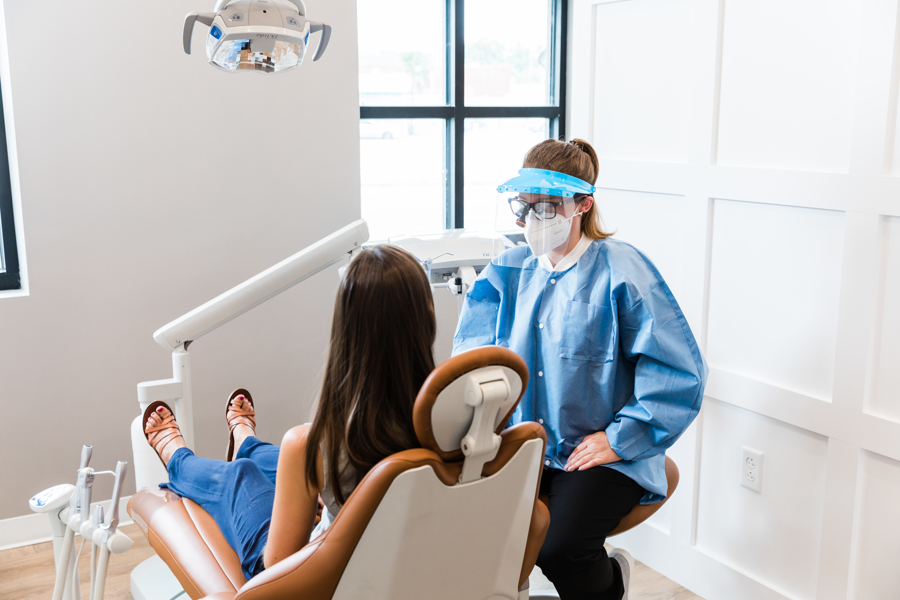Why You Need To Pick a Local Dentist Eugene for Personalized Treatment
Why You Need To Pick a Local Dentist Eugene for Personalized Treatment
Blog Article
A Guide to Usual Dental Conditions That Require a Dental expert's Treatment
Comprehending the series of oral problems that demand expert treatment is extremely important for keeping ideal oral health and wellness. Toothaches, as an example, can be symptomatic of extreme concerns such as dental caries, cracked teeth, or abscesses, each calling for specific treatments like fillings or root canals. Gum condition, from the beginning of gingivitis to more extreme periodontitis, highlights the relevance of normal dental examinations and cleansings. Moreover, impacted wisdom teeth and jaw problems can present substantial discomfort and issues. Making sure prompt brows through to the dental expert can minimize these issues properly, yet what exactly are the therapies and indicators included?
Toothaches
Toothaches are a typical dental condition that can vary from moderate discomfort to extreme discomfort, commonly indicating a hidden problem that requires expert focus. This discomfort can come from a selection of resources, consisting of tooth decays, split or fractured teeth, and dental abscesses. Each of these problems presents substantial dangers if left neglected, possibly resulting in more extreme complications.
Oral cavities, additionally recognized as cavities, are caused by the build-up of plaque that wears down tooth enamel, leading to holes or pits in the influenced teeth. Abscesses are agonizing infections at the root of a tooth or in between a tooth and the periodontal, typically resulting from extreme degeneration or neglected cavities.
Efficient therapy of toothaches includes dealing with the source. This may consist of dental fillings for cavities, crowns for fractured teeth, or root canals and prescription antibiotics for abscesses. Very early intervention by an oral professional can stop more deterioration and alleviate pain, making sure optimal dental health.
Gum Condition
Periodontal condition, a prevalent yet usually forgotten dental condition, shows up through swelling and infection of the gums and supporting cells. This condition mostly takes place in two stages: gingivitis and periodontitis. Gingivitis, the milder form, presents with signs such as red, puffy periodontals that might hemorrhage easily throughout cleaning or flossing. If left without treatment, gingivitis can progress to periodontitis, a much more severe form defined by the damage of the sustaining bone and connective tissue, ultimately causing missing teeth.
The key source of periodontal illness is microbial plaque, a sticky, anemic movie that frequently bases on teeth. Poor dental health, smoking, hereditary proneness, and particular medical conditions, such as diabetes, can exacerbate the threat of developing periodontal disease. Regular oral check-ups are important for early detection and management of this condition.
Therapy for gum tissue illness varies from expert oral cleansing and scaling to more innovative treatments like root planing and gum surgical treatment, depending upon the intensity. Preserving great oral health practices, consisting of cleaning twice daily, flossing, and utilizing an antibacterial mouth wash, can significantly lower the danger of gum disease and advertise healthier gums.
Cavities
Dental caries, also referred to as cavities, are a common dental problem identified by the damage of tooth enamel as a result of acid-producing germs in the mouth. These bacteria grow on sugars and starches from food and drinks, producing acids that slowly erode the enamel, bring about tooth cavity development.
Early-stage cavities might disappoint symptoms, however as they proceed, they can cause toothache, sensitivity to chilly or hot, noticeable holes or pits in the teeth, and discoloration. If left neglected, dental caries can penetrate deeper layers of the tooth, potentially causing severe discomfort, infection, and even missing teeth.
Protecting against tooth cavities involves a mix of excellent dental hygiene practices and nutritional behaviors. Regular brushing with fluoride tooth paste, flossing, and routine oral examinations are vital. Dental experts might also recommend added precautionary procedures, such as fluoride therapies and oral sealants, to safeguard teeth from degeneration.
Small cavities can be addressed with oral fillings, which recover the tooth's framework. More advanced cases might need crowns or also root canal therapy if the degeneration has gotten to the tooth's pulp.

Impacted Wisdom Teeth
Affected wisdom teeth are a common oral concern that happens when the 3rd molars, generally described as wisdom teeth, fall short to fully emerge or line up properly within the mouth. This problem often results from inadequate room in the jaw or an unusual development angle of the teeth. Influenced knowledge teeth can result in a selection of complications, including damage, discomfort, and infection to adjacent teeth.
When wisdom teeth become impacted, they read here are typically partly appeared or continue to be entirely beneath the gum line. This partial eruption can produce a pathway for bacteria to get in the gum tissues, bring about infections that manifest as swelling, discomfort, and even high temperature. Furthermore, affected wisdom teeth can put in pressure on bordering teeth, potentially creating crowding or moving.
An extensive dental exam, normally including X-rays, is important for diagnosing influenced wisdom teeth. Normal dental check-ups are suggested to keep an eye on the condition and preserve oral health and wellness.
Jaw Disorders
Jaw conditions, jointly referred to as temporomandibular joint (TMJ) conditions, incorporate a range of problems that impact the jaw joint and surrounding muscle mass. These problems can manifest through signs such as discomfort or tenderness in the jaw, problem eating, a popping or clicking noise when closing the mouth or opening up, and also persistent headaches. TMJ conditions can develop from numerous aspects, consisting of joint inflammation, jaw injury, or habitual habits like teeth grinding or jaw clenching.
Diagnosis of TMJ disorders generally involves a comprehensive analysis by a dentist, including a checkup of the jaw, oral X-rays, and sometimes advanced imaging strategies click to read more like MRI or CT scans to evaluate the joint's problem. Therapy alternatives vary depending on the intensity of the condition. Non-invasive approaches such as physical therapy, oral splints, and medicines targeted at lowering swelling and discomfort are often first-line treatments. In a lot more serious instances, medical interventions might be needed to remedy architectural problems within the joint.
Early treatment by an oral expert is important to stop the progression of TMJ disorders and to keep total dental health. Patients experiencing relentless jaw discomfort or disorder ought their website to seek timely examination and treatment.
Verdict
Toothaches typically indicate underlying concerns such as cavities, broken teeth, or abscesses, calling for prompt intervention. Influenced wisdom teeth and jaw problems additionally need professional interest to minimize discomfort and protect against additional issues.
Oral cavities, additionally known as cavities, are triggered by the build-up of plaque that wears down tooth enamel, leading to openings or pits in the affected teeth. Abscesses are uncomfortable infections at the origin of a tooth or between the periodontal and a tooth, typically resulting from severe degeneration or untreated tooth cavities.

Furthermore, influenced wisdom teeth can exert pressure on bordering teeth, potentially creating crowding or moving.
Report this page